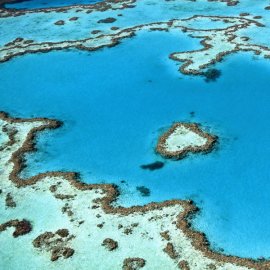How About Some Good Ocean News?
-
English
-
ListenPause
[intro music] Welcome to World Ocean Radio… I’m Peter Neill, Director of the World Ocean Observatory. Too often, ocean news is bad news – stories of pollution, over-fishing, sea level rise, and the consequences of extreme weather – that added to comparable news regarding similar problems on land does little to uplift our spirits or sense of optimism for the future. Following ocean news can frustrate, anger, and depress, and otherwise upset me, and why should I share such dark thoughts with you yet again? So, here are some headlines taken from the March/April issues of ECO Magazine, a professional publication devoted to coastal and offshore environmental problems and technological response and exploring regulation, assessment, mitigation, and restoration of ocean conditions. Reading these headlines, I was struck by the positive aspect of so many of them: an aggregation of progressive engagement toward ocean solutions in the United States and around the world. Here are some of them: • Connecticut Issues Offshore Wind Request for Proposals • New Jersey Governor Signs Order to Promote Offshore Wind Energy • California Increases Penalty for Fishing in Protected Areas • Comeback of Aquatic Grasses in Chesapeake Bay • Opinion: Expand Efforts to Reduce Marine Plastic in Scotland • New Map of Flood Risk Area Around San Francisco Bay • To Protect Arctic, US and Russia Propose Bering Strait Shipping Routes • Self-driving Robots Create Snapshots of Ocean Microbes • Scientists Pinpoint How Ocean Acidification Weakens Coral Skeletons • XPrize Ocean Discovery Finalists Announced: Accelerating Unmanned Ocean Exploration • Major Storms and Community Resilience • California Drought Cycles Drive Water Districts to be as Efficient as Possible • Latest Practices Uses in Ocean and Coastal Citizen Science • Simulation of Environmental Risk of Sanchi Oil Tanker Contamination • Monitoring Coral Reef Disease in Caribbean Waters • Tracking Mysterious Marine Mammals in the Arctic • Teaching Science Communication to Children When you read through this list you see a full spectrum of technological and academic response to very specific challenges to ocean species, habitats, and processes; examples of innovative applied engineering and artificial intelligence; global partnerships and international collaborations to share capacity, funds, and access; and a commitment to serious investigation toward the sustainability of the natural resources – plant, animal, and human – in the ocean environment. This is all very good news. It provides hope through the expression of science, curiosity, and ingenuity to transcend the bad news of past indifference to and ignorance of the ocean world. That’s our purpose at World Ocean Observatory: to foster optimism and to suggest solutions, and to share that news far and wide amongst all Citizens of the Ocean on earth. We will discuss these issues, and more, in future editions of World Ocean Radio. WORLD OCEAN RADIO IS DISTRIBUTED BY THE PUBLIC RADIO EXCHANGE AND THE PACIFICA NETWORK FOR USE BY COLLEGE AND COMMUNITY RADIO STATIONS WORLDWIDE. FIND US WHEREVER YOU LISTEN TO YOUR FAVORITE PODCASTS, and at WORLD OCEAN OBSERVATORY DOT ORG.
Ocean news is often bad news these days. We are bombarded with stories of pollution, overfishing, of sea level rise and the dire consequences of extreme weather and CO2 emissions. This week on World Ocean Radio, however, we're focusing on some good ocean news. In this episode we share some optimistic and encouraging headlines from the March/April issue of ECO magazine: a collection of stories highlighting progressive ocean solutions in the US and around the world.
The weekly blog post of this episode is available at Medium.com/@TheW2O.
About World Ocean Radio
Peter Neill, Director of the World Ocean Observatory and host of World Ocean Radio, provides coverage of a broad spectrum of ocean issues from science and education to advocacy and exemplary projects. World Ocean Radio, a project of the World Ocean Observatory, is a weekly series of five-minute audio essays available for syndicated use at no cost by college and community radio stations worldwide. A selection of episodes is now available in Portuguese, Spanish, French, Swahili, and Mandarin, enabling us to reach 75% of the world's population. For more information, visit WorldOceanObservatory.org/world-ocean-radio-global.
Image Credit
Yanguang Lan | Unsplash
- Login to post comments



